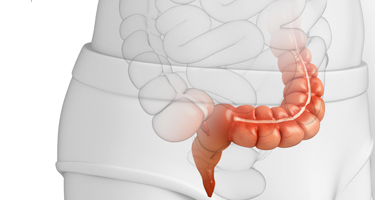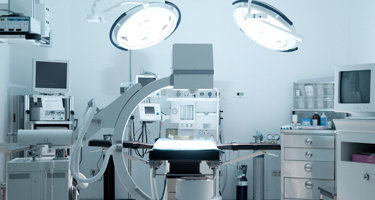Colon Resection

Laparoscopic Colon Resection for Cancer
A colon resection, also known as a colectomy, is a surgical procedure to remove either part of or all of the large intestine (the colon). It is used to treat both benign and malignant tumors, and is usually effective in stopping the spread of colon cancer. A colon resection is often performed using laparoscopic surgery. Often referred to as minimally invasive surgery, laparoscopic surgery is used primarily to treat early-stage cancers.
Laparoscopic Colon Resection Procedure

A laparoscopic colon resection requires three to six small incisions in the abdomen for the insertion of a laparoscope, a long flexible tube that has a small video camera on the end, and other small surgical instruments.
The video camera provides magnified, high-definition images that the surgeon uses as guides in performing the procedure. To improve the visual field, the abdomen is inflated with gas. Depending on a patient's individual condition, all or a portion of the colon, as well as lymph nodes and a margin of surrounding healthy tissue, will be removed. If only a portion of the colon is removed, the resultant ends will be stitched together.
Advantages of Laparoscopic Colon Resection

Although a colon resection can be performed in a traditional open-surgery procedure, many patients now undergo laparoscopic treatment. Advantages of a laparoscopic colon resection compared to traditional colon resection include:
- Smaller incisions
- Less scarring
- Shorter recovery time
- Less bleeding
Laparoscopic resection is considered a suitable procedure for curable colorectal malignancies.
Risks of Laparoscopic Colon Resection
Risks from any kind of laparoscopic procedure are fewer than the risks of open surgery. They do exist, however, and include:
- Infection
- Excessive bleeding from the incisions
- Damage to an organ or blood vessel
- Allergic reaction to medications or anesthesia
Laparoscopic colon resection involves a steep learning curve for the surgeon who will perform it. Both the surgeon and operating room staff need to be thoroughly trained in the procedure to minimize additional risks to the patient.
Laparoscopic Colon Resection for Diverticulitis
Diverticulitis is the inflammation of the diverticula, small pouches found in the inner lining of the intestinal tract. Most often these pouches are harmless but they can become infected and inflamed. A colon resection is a surgical treatment for diverticulitis, and may also be performed to treat the following conditions:
- Benign or malignant tumors
- Crohn's disease
- Volvulus
A laparoscopic colon resection requires three to four small incisions for the insertion of a laparoscope and tiny surgical instruments. The procedure is performed with imaging guidance through these incisions. The abdomen will be inflated with gas to improve the visual field. A portion of the colon will be removed, its size and location will depend on the patient's individual condition.
While colon resection can be performed through a traditional open procedure, a laparoscopic colon resection offers many benefits to the patient, including the following:
- Less scarring
- Less bleeding
- Shorter recovery time
- Shorter hospital stay
Many patients with diverticulitis can benefit from laparoscopic colon resection to relieve the symptoms of their condition with minimal risks or side effects.
Our Surgeons Specializing in Colon Cancer Resection, and Diverticulitis Conditions

- Allen Agapay, MD
- General Surgeon
- Peoria
- Learn More

- Aisha Akhtar, MD, FCPS
- Colon & Rectal Surgeon
- Glendale & Scottsdale
- Learn More

- Adrienne Forstner-Barthell, MD, FACS, FASCRS
- Colon & Rectal Surgeon
- Glendale
- Learn More

- Ravia Bokhari, MD, FACS
- General Surgeon
- West Phoenix
- Learn More

- Michael Buckmire, MD, FACS, FASCRS
- Colon & Rectal Surgeon
- Mesa & Gilbert
- Learn More

- Ashley R. Casano, DO, FACS
- Colon & Rectal Surgeon
- Gilbert & Mesa
- Learn More

- Charles Castillo, MD, FACS
- General Surgeon
- Central Phoenix
- Learn More

- Susan Cortesi, MD, FACS
- General Surgeon
- Mesa & Scottsdale
- Learn More

- Jordan Glenn, DO, FACS
- General Surgeon
- Peoria
- Learn More

- Rita Hadley, MD, FACS, PhD
- General & Bariatric Surgeon
- Mesa
- Learn More

- Richard Harding, MD, FACS
- General Surgeon
- Central Phoenix
- Learn More

- Sumeet Kadakia, MD, FACS
- General Surgeon
- Gilbert
- Learn More

- Jon King, MD, FACS
- General Surgeon
- West Phoenix
- Learn More

- Daveshni Kumar, MD, FACS
- General Surgeon
- Mesa & Scottsdale
- Learn More

- Tafadzwa Makarawo, MD, MRCS(Ed), FACS
- Colon & Rectal Surgeon
- Glendale
- Learn More

- C. Amir Esparza Monzavi, MD
- Colon & Rectal Surgeon
- Buckeye & Phoenix
- Learn More

- Sushil Pandey, MD, FACS, FASCRS
- Colon & Rectal Surgeon
- Sun City West
- Learn More

- Jeffrey Perumean, MD, FACS
- Trauma & Acute Care Surgeon
- Mesa
- Learn More

- Karthik Raghavan, MD, FACS
- General Surgeon
- Glendale
- Learn More

- Jennifer Reitz, MD, FACS
- General Surgeon
- Gilbert
- Learn More

- Greg Rula, MD, FACS
- General Surgeon
- Mesa
- Learn More

- Neeraj Singh, MD, FACS, FASCRS
- Colon & Rectal Surgeon
- Glendale, Phoenix & Scottsdale
- Learn More

- David Smith, MD, FACS
- General Surgeon
- West Phoenix
- Learn More

- Craig Szafranski, MD, FACS
- General Surgeon
- Mesa
- Learn More

